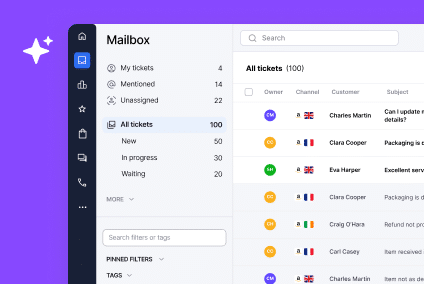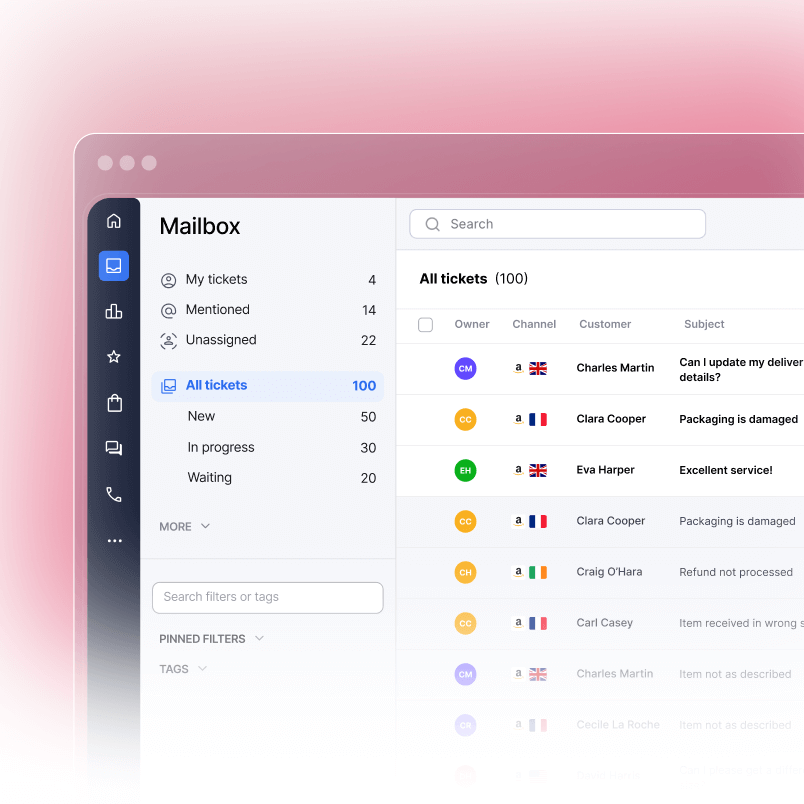What makes some B2B sellers scale effortlessly while others struggle with manual processes and errors? The answer lies in strategic integrations that connect your marketplace operations with the tools you already use.
Mirakl B2B integrations transform scattered workflows into automated systems that handle inventory, orders, and customer communications without constant oversight. This guide explores proven integration strategies that help B2B sellers reduce operational costs, eliminate errors, and create exceptional buyer experiences.
How Do Mirakl B2B Integrations Work?
Mirakl B2B integrations connect your marketplace with existing business systems through APIs that enable automatic data exchange. Your ERP, CRM, inventory management, and accounting platforms communicate directly with your Mirakl marketplace.
When a customer places an order, the integration triggers a chain reaction. Inventory updates across all channels. Your fulfillment system receives order details. Your accounting software records the transaction. Customer service teams see the complete order history instantly.
The Technical Foundation
Mirakl API B2B provides the framework for these connections. The API handles authentication, data formatting, and error management, ensuring reliable communication between systems.
Integration middleware translates data between different platforms. Your SAP system speaks a different language than Shopify, but middleware converts information into formats each system understands.
Why B2B Requires Specialized Integration
B2B transactions involve complexities that standard eCommerce integrations miss. Benefits B2B sellers get from purpose-built integrations include support for custom pricing tiers, contract-based ordering, and bulk purchase workflows.
Research shows that 80% of B2B buyers now expect a buying experience similar to B2C, including personalized content and seamless interactions, pushing sellers to adopt sophisticated integration strategies.
What Are the Most Important Integrations for B2B Sellers?
Inventory Management Systems
Real-time inventory synchronization prevents overselling and stock discrepancies. Your Mirakl B2B marketplace displays accurate availability across warehouses and distribution centers.
Critical features include:
- Automatic stock level updates every few minutes
- Multi-location inventory tracking for distributed operations
- Low-stock alerts that trigger reorder workflows
- Batch inventory updates for catalog changes
Enterprise Resource Planning (ERP) Connection
ERP integration creates a single source of truth for product data, pricing, and customer information. When you update product specifications in your ERP, changes appear on your marketplace instantly.
Studies show that 78% of organizations reported improved productivity after ERP implementation, while 62% reduced costs in purchasing and inventory control.
Customer Relationship Management (CRM) Integration
CRM connections provide complete visibility into customer relationships. Your sales team sees marketplace activity alongside traditional sales data, enabling personalized service and targeted upselling.
Payment and Accounting Systems
Financial integrations automate reconciliation and reduce accounting errors. Transactions flow from Mirakl into your accounting software with proper categorization and tax calculations.
How Does Automation Improve Marketplace Performance?
Order Processing Automation
Streamlined workflows eliminate manual order entry and routing decisions. Orders move from placement to fulfillment without human intervention for standard transactions.
Automation handles:
- Order validation and fraud checks
- Automatic routing to appropriate fulfillment centers
- Shipping label generation
- Tracking number updates to customers
Dynamic Pricing Strategies
Automated pricing adjusts based on competitor activity, inventory levels, and customer segments. Research shows that AI-powered dynamic pricing strategies can increase profitability by up to 22%, adapting to market conditions and competitor activity.
Pricing rules consider factors like order volume, customer loyalty status, and seasonal demand patterns.
Customer Communication Sequences
Automated messaging keeps buyers informed throughout the purchase journey. Confirmation emails, shipping updates, and delivery notifications send at appropriate times without manual effort.
Research shows that 77% of business leaders recognize that deeper personalization leads to increased customer retention, making tailored communication essential for B2B success.
Inventory Forecasting
Predictive algorithms analyze sales patterns and suggest optimal reorder points. Automated purchase orders to suppliers prevent stockouts while minimizing excess inventory costs.
Companies using AI-powered inventory forecasting reduce stockouts by up to 65% and cut excess inventory by similar margins.
What Results Do Sellers See from Mirakl Integrations?
Industrial Equipment Distributor Transformation
A heavy machinery distributor integrated Mirakl with their existing SAP infrastructure and Salesforce CRM. Their results after eight months:
- 35% faster order processing times
- 22% increase in order accuracy
- 50% reduction in customer service response time
- 19% growth in customer lifetime value
The integration enabled automated quote generation for complex equipment configurations, reducing sales cycle length significantly.
Office Supplies Marketplace Growth
A B2B office supply seller connected their warehouse management system with Mirakl marketplace operations. Key outcomes included:
- 65% fewer manual data entry errors
- Automated reorder suggestions for repeat customers
- Real-time inventory visibility for enterprise buyers
- Custom pricing tiers synced across all systems
Revenue increased 38% year-over-year while headcount remained stable, demonstrating true operational leverage.
Technology Reseller Efficiency Gains
A tech equipment reseller integrated Mirakl with multiple dropship vendors. The system automatically routes orders based on inventory location and shipping requirements.
Results included 85% reduction in stockouts and 42% improvement in delivery speed.
How Should You Implement Mirakl Integrations?
Start with High-Impact Connections
Begin with inventory and order management integrations. These provide immediate operational benefits and establish the foundation for advanced automation.
Focus on systems that touch every transaction rather than specialized tools with limited usage.
Design for Future Growth
Build integration architecture that scales with your business. Consider marketplace expansion, additional product categories, and international operations when selecting integration partners.
Choose middleware platforms that support multiple systems rather than point-to-point connections that become unmanageable as you grow.
Research shows that B2B eCommerce sales will reach $3 trillion by 2027 in the United States alone, making scalable infrastructure essential for long-term success.
Establish Data Governance
Create clear rules for data ownership, update frequency, and conflict resolution. When your ERP and marketplace show different inventory numbers, which system wins?
Document data flows and transformation rules so your team understands how information moves between systems.
Monitor Key Metrics
Track order accuracy, processing speed, inventory sync time, and customer satisfaction scores. Use this data to identify bottlenecks and optimization opportunities.
Set up automated alerts for integration failures so you resolve issues before they impact customers.
Train Your Team Properly
Ensure staff understand new workflows and know how to handle exceptions. The best integration fails without proper user adoption.
Create documentation and provide hands-on training for all team members who interact with integrated systems.
Mirakl B2B integrations transform complex marketplace operations into efficient growth engines that scale with your business. By connecting existing systems with marketplace functionality, you eliminate repetitive tasks, reduce errors, and create superior buying experiences that drive customer loyalty.
The most successful sellers start with core integrations, measure results carefully, and expand automation as they learn what works for their specific operations. Ready to transform your B2B marketplace performance?
Book a demo of eDesk’s Mirakl integration and discover how automated workflows create sustainable competitive advantages. Start your journey at eDesk and experience streamlined marketplace management firsthand.
FAQs
How does Mirakl B2B integration work?
Mirakl B2B integration connects your marketplace with existing business systems through APIs that enable automatic data exchange. Information flows between your ERP, CRM, inventory management, and other platforms without manual data entry, ensuring consistent information across all systems.
What benefits do B2B sellers get from Mirakl?
B2B sellers gain automated inventory updates, faster order processing, centralized customer support, dynamic pricing capabilities, and reduced operational costs. Most sellers see 25-45% efficiency improvements within the first six months of implementation.
Which systems integrate best with Mirakl for B2B operations?
Popular integrations include SAP, Oracle, Microsoft Dynamics, Salesforce, NetSuite, and specialized B2B eCommerce platforms. The best choice depends on your existing technology stack, business requirements, and future growth plans.
How long does Mirakl B2B integration take to implement?
Basic integrations typically take 6-10 weeks, while complex multi-system implementations require 3-6 months. Timeline depends on system complexity, customization requirements, data migration scope, and your team’s technical resources.
What costs are involved in Mirakl B2B integration?\
Integration costs vary based on system complexity and customization requirements. Budget for initial setup fees, middleware licensing, ongoing maintenance, and potential system upgrades. ROI typically appears within 8-14 months through operational efficiency gains and revenue growth.




